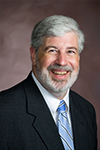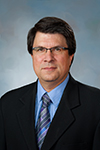UHV faculty wins national award for spiritual communication research
Mark Ward Sr., an associate professor of communication at the University of Houston-Victoria, recently was named the recipient of a 2019 national award for outstanding article of the year in spiritual communication.
The award will be given during the Nov. 14 to 17 annual convention of the National Communication Association in Baltimore and is conferred by the association’s Spiritual Communication Division. The winning article, “‘Head Knowledge Isn’t Enough’: Bible Visualization and Congregational Culture in the Evangelical Church,” was published in the Interdisciplinary Journal of Research on Religion.
“Spirituality in the Western world has long been communicated through visual images,” Ward said. “Think of the artwork in medieval cathedrals and the icons and vestments historically used in Christian liturgies. Yet the visual communication of spirituality in today’s digitized and increasingly image-driven society has received less attention.”
The question of how meaning is communicated visually has challenged scholars, who by training are more text-driven than image-driven, Ward said. An orientation to the written word also is true in modern evangelical churches, which base their doctrines on a belief that the Bible is the word of God. According to surveys, 1 in 4 Americans identify as evangelical Christians, making evangelical Protestantism the nation’s single largest religious tradition.
“Yet, despite their orientation to biblical texts, the use of PowerPoint for sermons and congregational singing is common in evangelical churches,” he said. “Megachurches go further and use multimedia to give worshipers a sense of awe and transcendence.”
Ward’s research found that an increasing reliance in sermons on visual illustrations and word pictures can impact church cultures. While evangelicals prize sermons that extract meaning out of the biblical text, “the most widespread practice is taking a scriptural passage and making an ‘application’ or projecting your own needs onto the text,” Ward said. “Use of visual images and visually-oriented word pictures can accelerate that process by further weakening connections to the actual text.”
Historically, evangelicals’ emphasis on taking the Bible literally has promoted a view of the Christian gospel as a set of logical propositions that believers mentally accept, he said.
“But that view of spirituality as ‘head knowledge’ has become unsatisfying for many evangelicals,” Ward said. “They also see the gospel as something to be experienced and lived. That orientation is both reflected in and shaped by the visual communication of spiritual meaning.”
A leading scholar on popular religious media and culture, Ward has published four books on the subject, plus numerous scholarly articles, and has been quoted in the national media. His work previously has received national recognition, including an award from the Religious Communication Association earlier this year. In 2018, he was the recipient of the UHV Research and Scholarly Activity Excellence Award.
“Dr. Ward’s research into topics that impact the U.S. religious community has earned many awards and accolades through the years,” said Jeffrey Di Leo, dean of the UHV School of Arts & Sciences. “UHV is proud to see his work receive another well-deserved national honor.”
The University of Houston-Victoria, located in the heart of the Coastal Bend region since 1973 in Victoria, Texas, offers courses leading to more than 80 academic programs in the schools of Arts & Sciences; Business Administration; and Education, Health Professions & Human Development. UHV provides face-to-face classes at its Victoria campus, as well as an instructional site in Katy, Texas, and online classes that students can take from anywhere. UHV supports the American Association of State Colleges and Universities Opportunities for All initiative to increase awareness about state colleges and universities and the important role they have in providing a high-quality and accessible education to an increasingly diverse student population, as well as contributing to regional and state economic development.
Lauren Hightower-Emerson
361-570-4342






